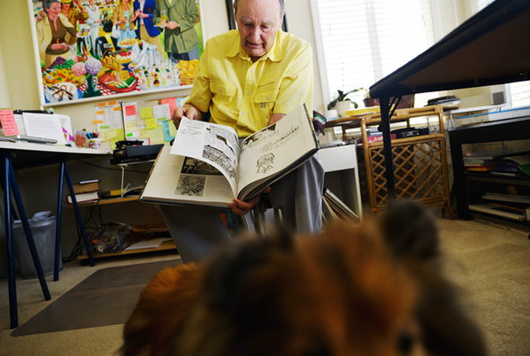

When World War II ended, people danced in the streets, and the Vietnam War ended with a dramatic evacuation of the U.S. embassy.
But 60 years ago Saturday, the Korean War came to a close rather unceremoniously and with no clear victor. On July 27, 1953, an armistice was signed to end the fighting, but a peace treaty was never reached. Technically, the war is still on.
The inconclusive ending may have something to do with why the conflict would become known as “The Forgotten War,” but it is certainly not forgotten by those who fought in it. Its significance also is not lost on those who know something about the Cold War and the long-term ramifications of the conflict.
Avery Chenoweth, of Perry, authored a book on Marine history that includes an extensive section on the Korean War.
In January 1951, Chenoweth was a 22-year-old Marine second lieutenant when he was sent to Korea. That was six months after North Korea invaded South Korea in a bid to forcibly reunify the nation that was split up in the aftermath of WWII.
Chenoweth was a Princeton graduate with an art degree and a talent for painting. He took command of a battle-hardened platoon that had just lost a dozen men, including the previous commander, in the ferocious Chosin Reservoir battle.
“They were tough as nails, and I looked like I was 17 years old,” he said. “When you are out with a bunch like that, you don’t have time to think about yourself.”
For the next 10 months, he stayed on the front lines, leading his men in a see-saw struggle in which North Korean forces would gain ground, then the U.S-led United Nations forces would push them back. Temperatures sometimes reached 40 below.
“I saw dead Army soldiers stacked up like frozen firewood,” he said. “The massacres were just unbelievable.”
The armistice established the 38th Parallel as a demilitarized zone that separates the two nations to this day.
North Korea, which claims to have won the war, is known as one of the most repressive regimes in the world. Although it took some time, South Korea has become a thriving democracy.
Chenoweth, who also fought in Vietnam and the Gulf War, said that makes the sacrifices worth it.
“From that primitive, backward country ... Seoul and South Korea are now the highlights of the Orient,” he said. “That’s what we did. We saved South Korea from becoming like North Korea.”
Wide-ranging influence
The preservation of democracy in South Korea is far from the only reason the war is significant.
It was the first war after President Harry Truman ordered integration of the armed forces. It was the first war in which jet planes and helicopters were used extensively. Chenoweth said he witnessed the first use of a helicopter in combat when he saw one fly in troops and supplies.
It was the first war in which the Air Force operated as a separate branch.
It was also the first time the U.N. took an active role in a conflict.
Javan Frazier, an associate professor of history at Middle Georgia State College and an expert on the Cold War, said the Korean War had a major influence on how the Cold War unfolded. Prior to Korea, he said, there was uncertainty whether the U.S. had the will to get involved in such a conflict to stop the spread of communism.
“The Korean War really demonstrated not only to the communist nations but even to America’s allies that America would fight to stop a country from becoming communist,” he said.
“It helped America gain a lot of credibility with its allies in that way. It showed the communists that if the U.S. will fight for Korea, what will they do for Berlin?”
Almost 1.8 million U.S. troops served in the Korean War, and about 37,000 were killed. For the time span of each conflict, it was even deadlier than Vietnam.
“I think they should feel very proud of what they did,” Frazier said of Korean War veterans. “They kept a nation from becoming communist.”
Chenoweth said what he would most like people to remember about Korea is how drastically the U.S. reduced its military forces after WWII.
“Who would have thought that five years after World War II, little old Korea would erupt and catch the United States with its pants down,” he said. “It is just like what is happening today ... with pulling the armed forces down, reducing their budgets. ... We are going to be just like we were after World War II, and something else is going to erupt.”



















